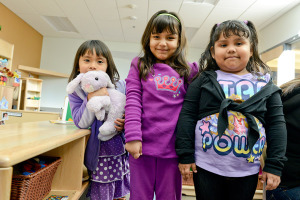A Cutting-Edge Preschool Program
The Educare program implements the latest science, research, and evidenced-based practices to ensure that low-income infants, toddlers, and pre-school children build the skills they need to arrive at kindergarten safe, healthy, eager to learn, and ready for school.



Cognitive and Social Skills Development
Educare teachers emphasize the equal importance of developing children’s pre-literacy and early math skills alongside their social-emotional skills.
- Pre-literacy – Recognize letters, interact verbally, be motivated to read.
- Early Math – Recognize numbers, count verbally, solve problems.
- Social-Emotional – Focus on a task, persist, self-regulate, control impulses, cooperate with peers.
Family Involvement
We involve families in their children’s development. Activities and interactions aim to strengthen parents’ ability to serve as champions for their child’s learning after they leave Educare and enter primary and secondary schools.
Continuity of Care
A unique component of the Educare model is practicing “continuity of care,” meaning each child stays with the same team of teachers from birth to age three. Children then move into a preschool classroom for students three to five years of age with a different team of teachers who stay with them until they’re ready to enter kindergarten. This continuity creates close bonds among children, teachers, and parents, reinforcing the stable relationships essential to learning.
Small Class Size and Low Teacher-Child Ratios
We keep class sizes small and teacher-child ratios low to ensure individualized care and instruction for every child who attends our school.
- Nine infant-toddler classrooms serve 8 children per class or 72 infant-toddlers total
- Seven preschool classrooms serve 17 children per class or 119 preschool children total
Quality Classroom Teachers and Support Specialists
- Every classroom has three teachers.
- Lead teachers hold a bachelor’s degree.
- Teachers holding a master’s degree supervise every four classrooms and work as coaches for other teachers.
- Full-time family support specialists and consultants (speech pathologists, behavioral specialists, and others) provide additional support to each child’s family.